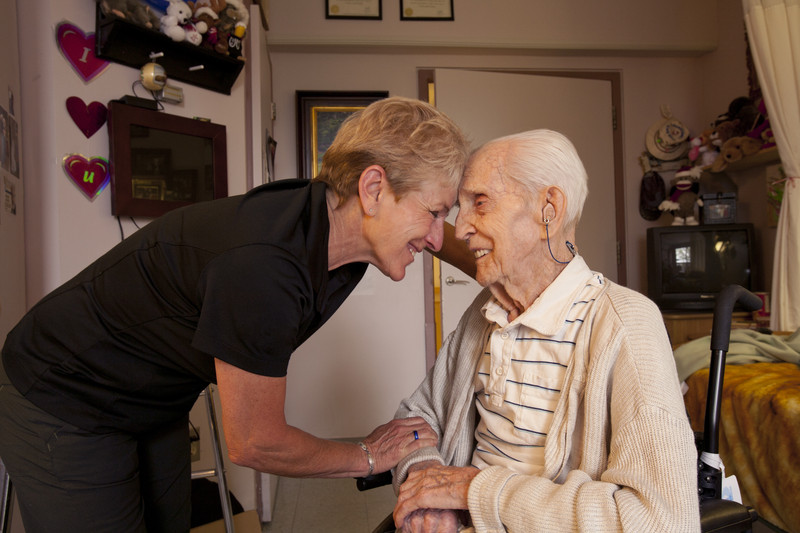Talking about Alzheimer’s to a Parent or Loved One
Seniors and Alzheimers | September 28, 2018

What Every Senior and Family in Victoria, BC Needs to Know About Alzheimer’s Disease
Talking about Alzheimer’s | Nobody looks forward to talking about Alzheimer’s to a parent or loved one. It’s a difficult topic that can feel overwhelming to both of you. If the parent or loved one is presently suffering from impaired judgment and memory loss, having a rational discussion about their symptoms can be difficult. There are loving ways to approach the conversation when a window of opportunity opens.
Get a Medical Diagnosis First
Since numerous medical issues can mimic early Alzheimer’s, you’ll want your loved one to get a full examination. After you have their approval to go to the doctor, plan the appointment as a part of a bigger day including some enjoyable activities. This will make the day better for both of you.
Confirm the Suspicion
Once the suspicion of Alzheimer’s is confirmed, you will want to have an open conversation with your loved one. If he or she has already been considering that something may be wrong, the dialogue may go more easily than you would think. Be sure to repeatedly reassure the patient that you care for them. Families that openly discuss the diagnosis and progression of the disease fare better emotionally.
As you consistently reassure your parent or loved one that you will not abandon them and will be there for them, you will ease their fears. Here are more suggestions:
- Depending on the cognitive state of the patient, perhaps participation in financial, medical, legal, long-term care, and end-of-life decisions will still be possible.
- Your loved one might deny or reject his or her diagnosis, and it’s also possible the conversation and diagnosis will not be comprehended.
- Obtain help from family or friends, and perhaps a social worker or clergy member who has experience with Alzheimer’s.
- Continue to keep conversations open while the Alzheimer’s Disease progresses.
- Allow the newly diagnosed parent or loved one to articulate emotions, such as anger, frustration, and sadness, which would all be normal.
- Always be on the lookout for symptoms of clinical depression so you can get professional help as needed.
Professional caregivers are available to help your loved one cope with Alzheimer’s. They can provide in-home assistance to not only help them but give you peace of mind.
At Comfort Keepers® Victoria we feel that home is the best place to be.
If you are concerned about the health and well-being of your aging loved ones we can help with 24-hour care, senior care, companionship care, end-of-life care, post-surgery care, palliative care, personal care, senior living transition services, and much more!
Comfort Keepers® Victoria Provides In-Home Elderly Care Services
Comfort Keepers® trained caregivers help provide senior clients with the highest quality of life possible to keep them happy and healthy at home. Our Interactive Caregiving™ provides a system of care that addresses safety, nutrition, mind, body, and activities of daily living (ADLs).
Comfort Keepers® Victoria In-Home Caregivers Can Help with Interactive Caregiving™
Our philosophy is to elevate the human spirit and our caregivers will be there every step of the way to ensure your loved one has a better quality of life. Personal and empathetic care is care that starts in the heart, and it allows us to meet our client’s exact needs. Learn more about our unique service which offers personal care, companionship care, palliative care, and end-of-life care by contacting the Comfort Keepers Victoria office.
Comfort Keepers® Victoria is proud to provide senior care and home care services to keep seniors safe in their homes.
If you are searching for home care near me, Comfort Keepers® Victoria can provide home care for the seniors of Victoria and the surrounding areas of Colwood, Saanich, Sidney, James Bay, and Oak Bay. Please call (778) 265-5999 and learn how your loved ones can receive compassionate, professional in-home care.
Comfort Keepers® Victoria has been accredited with Exemplary Standing with Accreditation Canada. Accreditation is an intensive process in which an organization’s processes, policies, and procedures are examined by industry experts against a set of quality standards. To achieve accredited status, Comfort Keepers offices met or exceeded the rigorous standards for Home Care companies, as defined by Accreditation Canada.
Individualized Home Care Options
Long-Term Home Care, 24 Hour Home Care & Short Term Care Options Customized for You






